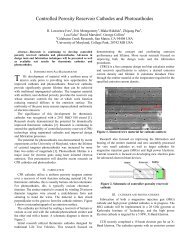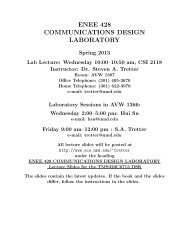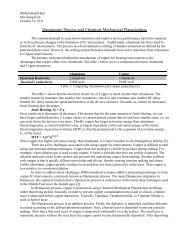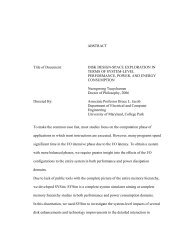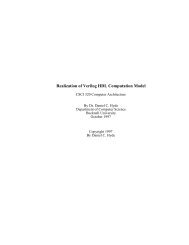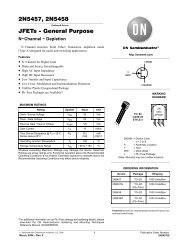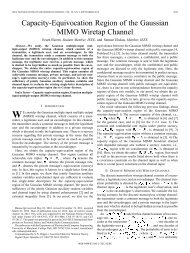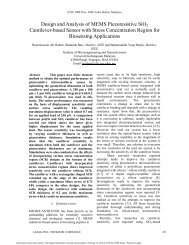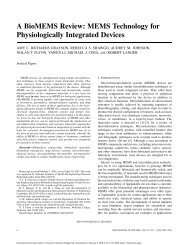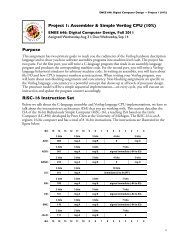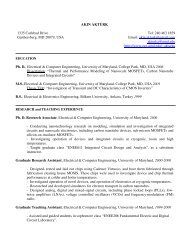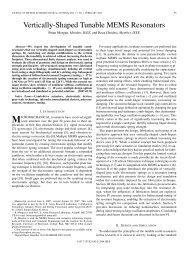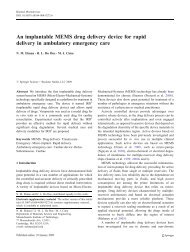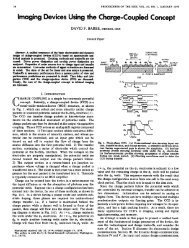Fall 2011 - ECE - University of Maryland
Fall 2011 - ECE - University of Maryland
Fall 2011 - ECE - University of Maryland
Create successful ePaper yourself
Turn your PDF publications into a flip-book with our unique Google optimized e-Paper software.
<strong>ECE</strong> DEPARTMENT ANNOUNCES FORMAL REDEFINITION OF<br />
UNDERGRADUATE PROGRAM EDUCATIONAL OBJECTIVES<br />
The Department <strong>of</strong> Electrical and Computer<br />
Engineering (<strong>ECE</strong>) has announced a formal<br />
redefinition <strong>of</strong> the program educational<br />
objectives and program constituencies for both<br />
the electrical engineering (EE) and computer<br />
engineering (CP) undergraduate majors.<br />
The Department’s two undergraduate<br />
programs are guided by a set <strong>of</strong> Program<br />
Educational Objectives (PEOs). The<br />
PEOs are determined by the needs <strong>of</strong><br />
the programs’ constituents and designed<br />
to be in harmony with the department<br />
mission statement. PEOs focus on what is<br />
expected <strong>of</strong> a program’s graduates early in<br />
their careers, specifically, within 3-5 years<br />
after graduation.<br />
Success in achieving the PEOs is<br />
regularly evaluated by soliciting feedback<br />
from alumni, employers, <strong>ECE</strong> faculty, and<br />
other program constituents. Representatives<br />
from each program’s constituencies are also<br />
involved in re-evaluating and recommending<br />
revisions to the PEOs.<br />
These activities constitute just<br />
one component <strong>of</strong> the Department’s<br />
commitment to continuous improvement<br />
in undergraduate education. In addition,<br />
all <strong>of</strong> these efforts directly support<br />
accreditation, <strong>of</strong> both the electrical and<br />
computer undergraduate programs, under<br />
the Engineering Accreditation Commission<br />
(EAC) <strong>of</strong> ABET, Inc.<br />
In 2009, <strong>ECE</strong> held a constituent<br />
retreat to review and revise the PEOs for<br />
both undergraduate programs. Attended by<br />
students, alumni, leaders from industry, and<br />
faculty, the retreat was a great success. The<br />
participants drafted new PEOs designed to<br />
take the undergraduate programs in new<br />
and exciting directions. The proposed<br />
PEOs were distilled and refined during<br />
the 2010-<strong>2011</strong> academic year by the<br />
Undergraduate Affairs Committee. Finally,<br />
the new PEOs were discussed by the<br />
Department Council and <strong>ECE</strong> Advisory<br />
Board before being approved by the <strong>ECE</strong><br />
faculty on May 20, <strong>2011</strong>.<br />
New Program Educational Objectives<br />
(for both EE and CP)<br />
Technical Accomplishments: Have our<br />
graduates establish a reputation for technical<br />
expertise and excellence among colleagues<br />
and achieve pr<strong>of</strong>essional recognition for their<br />
work, in graduate or pr<strong>of</strong>essional school and/<br />
or the technical workforce.<br />
Invention, Innovation, and Creativity:<br />
Have our graduates utilize their skills<br />
and resourcefulness to invent, design and<br />
realize novel technology; to find creative<br />
and innovative solutions to engineering<br />
problems; and to identify, research and<br />
solve new technical challenges in electrical<br />
engineering and related fields.<br />
Pr<strong>of</strong>essional Development: Have our<br />
graduates stay abreast <strong>of</strong> emerging technologies,<br />
continually learn new skills, and actively<br />
participate in pr<strong>of</strong>essional communities to<br />
nourish ever-developing careers.<br />
Pr<strong>of</strong>essionalism & Citizenship: Have<br />
our graduates embrace cultural, societal,<br />
environmental, and ethical issues in their<br />
work to help fulfill their pr<strong>of</strong>essional<br />
responsibilities to themselves, employers,<br />
employees, co-workers, and the local and<br />
global communities.<br />
Communication & Teamwork: Have<br />
our graduates excel on multi-disciplinary<br />
and multi-cultural teams, demonstrate<br />
leadership, and effectively employ their oral<br />
and written communication skills to resolve<br />
problems and inform, educate and persuade<br />
diverse audiences.<br />
Constituencies<br />
The primary constituencies with an<br />
interest in or needs satisfied by the EE<br />
undergraduate program are:<br />
A. JAMES CLARK SCHOOL <strong>of</strong> ENGINEERING � GLENN L. MARTIN INSTITUTE OF TECHNOLOGY<br />
Undergraduate EE students<br />
<strong>ECE</strong> Faculty<br />
EE Alumni<br />
Local, state, and national employers <strong>of</strong><br />
electrical engineers<br />
Relevant Graduate and Pr<strong>of</strong>essional<br />
Programs for EE<br />
The Public<br />
(NOTE: Only the EE constituencies are<br />
listed here. CP has a similar set.)<br />
Input is regularly solicited from each<br />
constituency with representatives from each<br />
group being integrated in different ways<br />
into the decision making processes that<br />
impacts the EE undergraduate program.<br />
The first five constituencies are essentially<br />
the same as previously defined by the<br />
Department, though there has been a<br />
refinement in the understanding <strong>of</strong> the<br />
needs <strong>of</strong> each <strong>of</strong> these groups. The sixth<br />
constituency is new.<br />
As a formally recognized group,<br />
“the Public” was added to the <strong>ECE</strong><br />
constituency list with the May 20, <strong>2011</strong><br />
PEOs vote. Understood in its many<br />
different senses, the Public encompasses<br />
local, state, regional, national, and<br />
international communities. However, for<br />
purposes <strong>of</strong> generating PEO feedback, this<br />
constituency is primarily focused at the<br />
local, state, and regional level.<br />
The interests and needs <strong>of</strong> the Public<br />
as they pertain to the EE program include:<br />
advancing the public health, safety,<br />
and well-being through technological<br />
developments; innovative advocacy <strong>of</strong><br />
the public interest through effective<br />
communication and active engagement<br />
with relevant communities and cultures;<br />
engineers who are technically competent<br />
and prepared to fulfill their pr<strong>of</strong>essional<br />
responsibilities and obligations to society;<br />
and enhanced economic development. C<br />
15



